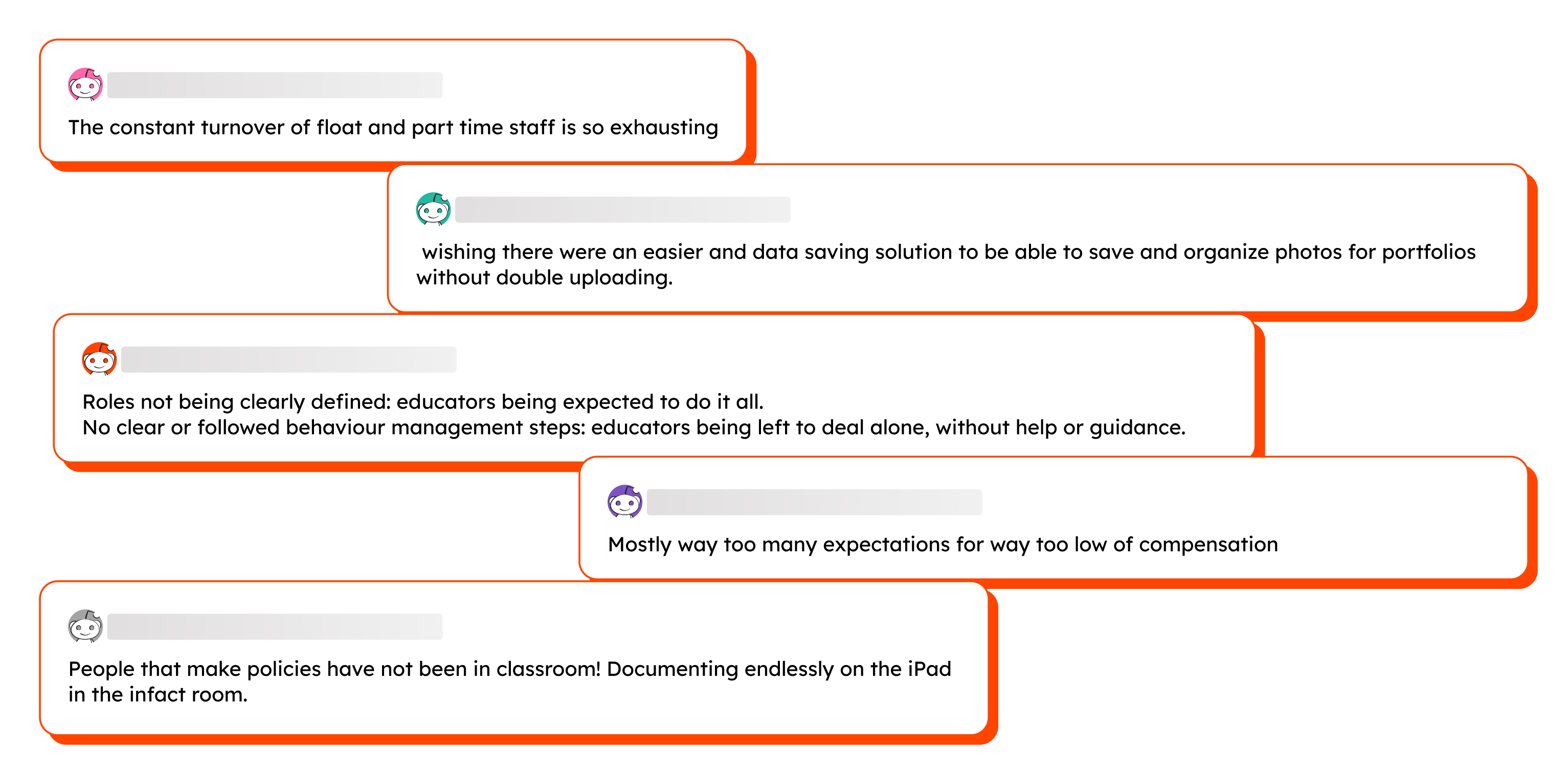As a preschool teacher, you face several new and unique challenges on an everyday basis. You often find yourself struggling with establishing the right curriculum, dealing with the different needs of toddlers at the same time, and communicating minor details about the kids with the parents.
The classroom is a completely new world and paradigm for the kids, so striking a balance between conducting the classes successfully and providing answers to the curiosities of the kids becomes crucial. Being a preschool teacher is both rewarding and demanding, and for those wondering, "Is being a preschool teacher hard?"—the answer lies in the everyday hurdles that define this vital role.

Key Takeaways
- Preschool teachers juggle more than teaching—administration, parent communication, and managing diverse developmental needs all compete for their time.
- Overloaded schedules and insufficient support often lead to stress and burnout.
- Miscommunication among staff and families can create unnecessary tension and delays.
- Lack of proper tools for planning and documentation adds to the workload.
- Access to the right technology, clear communication systems, and team support improves efficiency and morale.
- Investing in sustainable support structures is key to retaining great teachers.
12 Most Common Challenges Faced by Preschool Teachers
Many complexities come along with working as a preschool teacher. Let us take a look at a few of them, exploring the pros and cons of being a preschool teacher and the challenges in childcare that nursery school teachers encounter as we dive into the common problems faced by preschool teachers in 2026.
1. Managing the kids
Handling a classroom full of toddlers is never an easy task. Although it brings its own set of delightful moments, it can very well be exhausting. Every kid in the class has a different need, and catering to each of them while trying to instill productivity and creativity can be quite challenging.
It takes a lot of patience and effort in retaining the attention of the kids, who tend to get distracted easily. This is one of the common problems in kindergarten and a key challenge that teachers face, making working with preschoolers a test of patience, endurance, and adaptability—one of the cons of being a preschool teacher.
2. Executing the school curriculum
Along with struggling to teach the lessons and get the message across while managing several kids at once, preschool teachers face several other challenges in early childhood education in terms of effectively implementing the school’s curriculum. What do preschool teachers do? They juggle multiple responsibilities, and here’s how some early childhood education issues contribute to the common problems faced by preschool teachers:
- Lack of technology and tools
The emphasis on teaching in preschool with modern technology is more than ever right now, and most preschools are not equipped with the right tools to enable digital education for toddlers.
This results in teachers struggling to figure out ways to make up for the lack of technology and having to make do with imparting bookish learning—a persistent problem in early childhood education and one of the kindergarten problems that frustrates early childhood preschool teachers.
- Lesson planning is tedious
A huge chunk of a preschool teacher’s time goes into understanding the prescribed curriculum, making arrangements for various activities, and observing and documenting the kid’s progress. Planning lessons is not an easy job, given one needs to consider the development needs of several students in a class.
Hence, figuring out lesson plans that would work for everyone becomes difficult while also having to simultaneously handle day-to-day activities along with taking care of all the paperwork—an aspect that underscores why teaching in preschool is among the key challenges facing early childhood education today. That’s also why AI for lesson plan creation is recommended.
- Preparing assessment reports is time-taking
Formulating the assessment plan and then preparing reports based on the performance of the kids is just another task that preschool teachers are responsible for.
Since curriculum planning takes up most of the time of the teachers, it becomes a struggle for them to go through all the paperwork and create a child’s development report—one of the challenges teachers face with parents expecting detailed updates, adding to the issues in early childhood education. As far as teachers are concerned, it makes sense to learn how to effectively write preschool assessment reports.
3. Communicating with the parents
Keeping parents at par with their kid’s everyday learning and growth is one of the most important steps in the process of teaching in preschool. In other words, clear and transparent parent communication is another essential responsibility of the early childhood preschool teacher.
When parents are in the loop with their kid’s learning curve, their strengths, and weaknesses, they are best equipped with information to support the kid to grow to their best potential. It’s the teacher’s responsibility to make sure parents know the ins and outs of their child’s early education stage, as this is what makes up the foundation of how and what they grow into. But equipped with so many other tasks at hand, it is no easy job to update parents of every child in their class with the developments in the class each day.
This part of their job requires a lot of time, energy, and patience. So, what challenges do you face working in childcare? For many preschool teachers, it’s the ongoing struggle of communicating effectively with parents, which ranks high among the challenges teachers face with parents in this demanding role.
4. Handling paperwork
Preschool teachers need to maintain and update piles of paperwork daily. These documents usually include attendance records, meal plans, lesson plans, class activities, amongst other things. On average, early childhood educators spend 45 minutes each day on documentation.
This accounts for a huge amount of time, when we take the various other activities they do daily such as teaching, managing the kids, taking care of, and recording their meals and nap times into consideration—a clear con of being a preschool teacher and one of the challenges that teachers face.
5. Low salaries
One of the reports by the Center for the Study of Child Care Employment of the Institute for Research on Labor and Employment at the University of California, Berkeley states that on average, an early childhood educator earns just about $22,000 annually.
This figure, when compared to the other jobs out there, is almost shocking and demotivating. The uneven balance between the pay and the amount of workload is just another pressure point for the teachers, highlighting a significant con of being a preschool teacher and one of the issues faced by preschool teachers.
6. Lack of recognition and value
The work that preschool teachers do is honest and humble, but also very crucial. Some of the most important cognitive developments in a child happen before the age of 5, hence, by investing time and energy into making sure the toddlers grow into their best version, the teachers are not just helping out the parents but also laying the initial bricks that will form the foundation of the skills and intellect that a child develops upon growing up.
But even though the work they do is important, early childhood educators are often underestimated and for most parts unrecognized and unappreciated for the amount of effort they put in. Are preschool teachers real teachers? Yes—but this lack of recognition is one of the three challenges facing early childhood education today.
7. Inability to seek new opportunities
Most of the time, a preschool teacher is occupied with taking care of all the commitments they have at their respective childcare institutions. Hence, they barely have any time to focus on themselves or their careers. This often gets them stuck at where they are in their lives, with no time or opportunities to grow—a challenge in early childhood education that leaves many nursery school teachers feeling stagnant.
The relentless pace of daily tasks—lesson planning, managing kids, and paperwork—means personal development takes a backseat. For those passionate about being a preschool teacher, this constraint adds an extra layer of frustration, as the lack of bandwidth to explore new paths can lead to burnout. Societal and institutional support for career advancement in this field remains limited, making it one of the persistent challenges for preschool teachers.
8. Hindered career growth
Since because of their hectic schedules and already preoccupied lives, preschool teachers don’t get a chance to look out for or go after new opportunities, the room for growth is very little for them. This is what results in early childhood teachers being frustrated with their jobs, and is also a factor behind why many people, even if interested, don’t pursue this career—one of the early childhood issues impacting the field.
The inability to upskill or transition to higher roles stems from time constraints and a lack of structured support, leaving early childhood preschool teachers caught between their passion for teaching in preschool and the reality of limited upward mobility. This stagnation often breeds dissatisfaction, as dedication doesn’t always translate to professional rewards, amplifying the common problems faced by preschool teachers.
9. Balancing diverse needs
Every child’s unique needs require tailored attention, yet working with preschoolers demands maintaining a cohesive classroom. This balancing act is a persistent challenge in childcare that tests an early childhood preschool teacher’s skills daily, reinforcing why being a preschool teacher is so complex.
Teachers must adapt lessons and activities to suit varying developmental stages while keeping the group engaged—a task that requires emotional and intellectual agility. From soothing a shy child to challenging an advanced learner, the effort to meet these problems in early childhood education adds significant weight to the daily grind, often without extra resources or recognition.
10. Emotional and physical exhaustion
The emotional investment in nurturing young minds, paired with the physical demands of managing a classroom, leaves teachers drained. This exhaustion is one of the pros and cons of being a preschool teacher—a testament to why working as a preschool teacher is both fulfilling and taxing. Long days spent bending, lifting, comforting, and teaching, all while maintaining a cheerful demeanor, take a toll.
The challenges that teachers face here include suppressing their own fatigue to match the endless energy of toddlers, a reality that underscores the question, “Is being a preschool teacher hard?”—with the answer being an unequivocal yes. This dual burden is among the issues faced by preschool teachers, testing their resilience daily.
11. No time for career exploration
The intense day-to-day responsibilities of preschool teachers—ranging from managing a room full of toddlers to lesson planning and daily reporting—leave little to no room for personal or professional development.
Even teachers who are passionate about upskilling or attending workshops find themselves unable to commit due to sheer workload. This lack of time creates a barrier to exploring new roles, certifications, or specializations, resulting in professional stagnation over time.
12.Stagnant career growth
In early childhood education, opportunities for advancement are often few and far between. Even experienced and dedicated preschool teachers find themselves in the same position for years, with no clear progression into higher-paying or leadership roles.
The combination of institutional constraints and lack of time to pursue external certifications contributes to a sense of career stagnation. This can lead to frustration, burnout, and even talented educators leaving the field altogether—despite their passion for teaching and nurturing young children.
Challenges Preschool Teachers Face: Supporting Them Through Smart Solutions
Early childhood educators — especially preschool teachers — are constantly pulled in a dozen directions. From lesson planning and assessments to handling parent concerns and last-minute schedule changes, their role demands emotional, physical, and mental bandwidth. Much of their burnout and job dissatisfaction doesn’t stem from the children they care for — it stems from inefficient systems that weigh them down.
Instead of overhauling your entire workflow or playing the blame game, the more sustainable approach is to look at how technology can support your teachers. Automating repetitive tasks, centralizing communication, and simplifying documentation can go a long way in giving educators the breathing room they need to focus on what truly matters: the children.
Take illumine, for instance — a modern childcare management platform built to ease the everyday challenges of preschool educators.
- Its preschool assessment tool allows teachers to work with preloaded frameworks or customize their own — making it easy to track developmental milestones without spending hours building templates from scratch.
- The real-time parent communication feature lets teachers share updates on meals, naps, potty breaks, and activities instantly. Photos, videos, and notes can all be sent with just a few taps, keeping families in the loop and reducing end-of-day stress.
- With digital lesson planning, attendance, and reporting, teachers no longer have to rely on paper forms or scattered spreadsheets. Everything is managed in one place, saving time and reducing errors.
- Its daily report feature helps teachers create detailed activity logs with just a few clicks — no more end-of-day memory games or manual paperwork.
By centralizing these essential (but time-consuming) tasks, tools like Illumine allow teachers to reclaim their time and energy. This helps them better manage demanding parent expectations, confidently track children’s progress, and even carve out moments to recharge or focus on professional growth.
When we take care of our teachers, they’re in a much better position to take care of our children.
Final Thoughts
All in all, being a preschool teacher is a work of passion and commitment. The workload of the teachers is enormous and is also very challenging daily. As easy as it might sound, it’s not. It is truly time and effort-consuming work, but it also is rewarding in its ways.
The challenges that teachers face—from common problems in kindergarten to challenges teachers face with parents—paint a vivid picture of the pros and cons of being a preschool teacher.
Tools like illumine help alleviate some of the common problems faced by preschool teachers, but the question lingers: Are we doing enough to support these vital educators tackling issues in early childhood education every day?







![Solve daily teacher struggles easily with one software{{ include_custom_fonts({"Lexend":["Black","Bold","Extra Bold","Extra Light","Light","Medium","Regular","Semi Bold","Thin"]}) }}](https://no-cache.hubspot.com/cta/default/6338249/interactive-192922854567.png)



